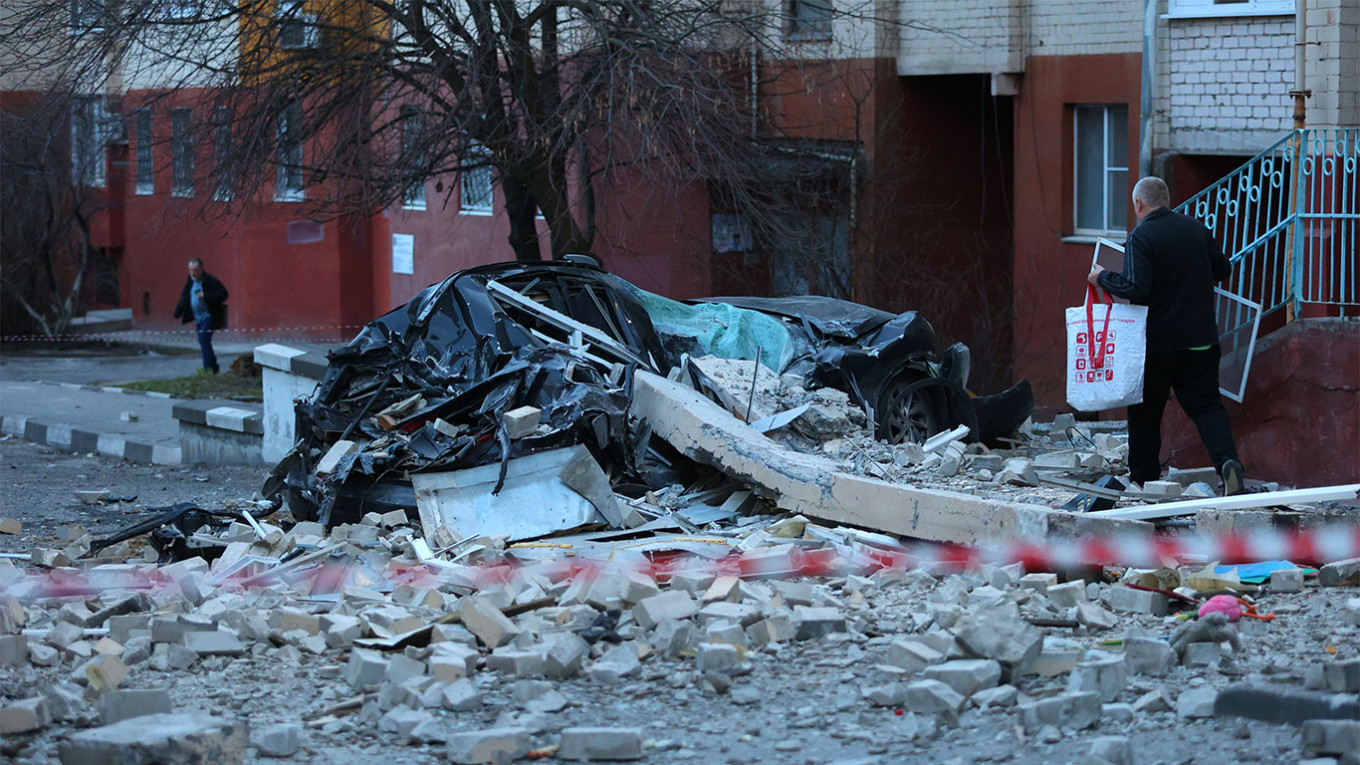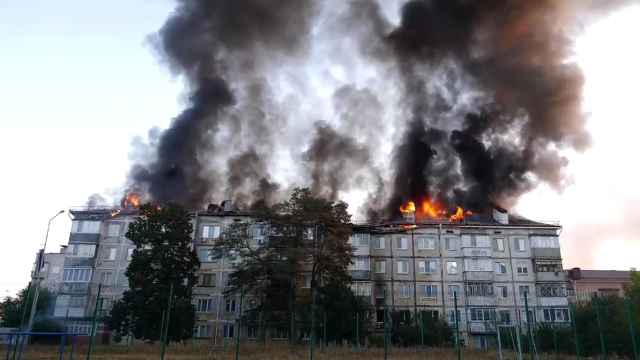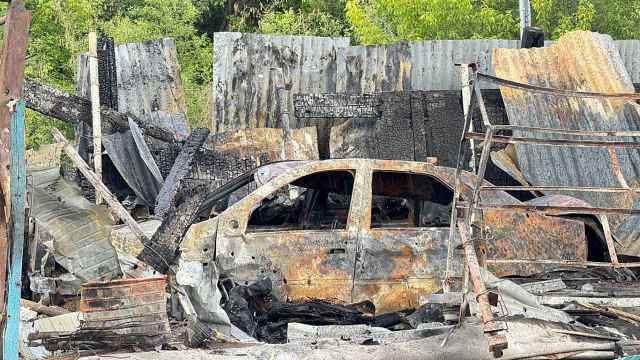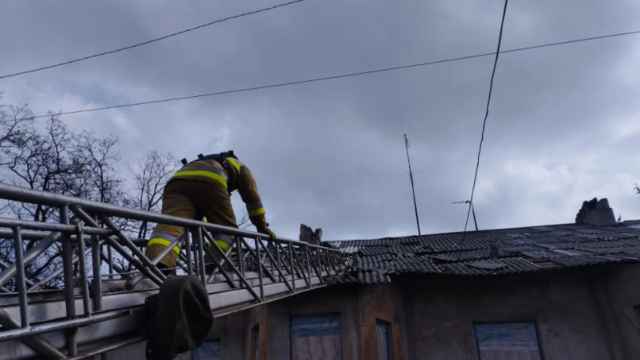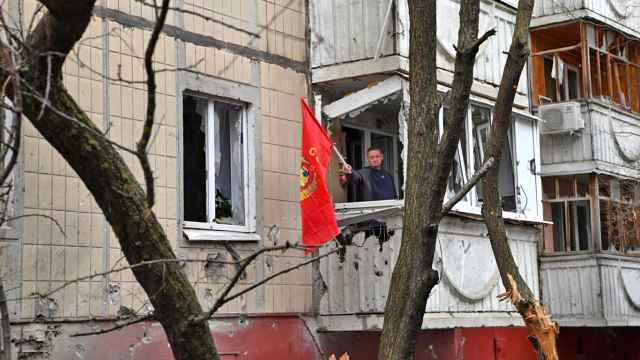After two years of war between Russia and Ukraine, what inhabitants of the Russian city of Belgorod feared most of all happened. It became the first Russian city to experience the war directly. Just a year ago, Belgorod was simply described as a border city. Now, the most accurate way to describe the city, which is increasingly heard in the media, is a frontline city in the war.
When the war first started, I was terrified. Most of my life has always been connected with Ukraine. As a child, I was always told we were brothers and neighbors. On Feb. 27, 2022, after returning home from a trip I had planned before the war, I sobbed in a cab to work because I didn't understand how my family could support this horror they call a “special operation.” I told the cab driver, who I didn't even know, and he cried with me. I remember him telling me, "Don't cry now. It will only get worse from here." At the time, I couldn't even imagine how much worse it would get.
Residents of Belgorod probably felt the most acute connection with Ukraine, especially Kharkiv, among all regions of Russia. By today’s standards, I had an amazing childhood. I frequently traveled to Kharkiv with my parents: we walked around the city, went to the water park and zoo, shopped at the Barabashovo market, and visited our relatives. Our cities are so close, linked by a train, that Belgorodians visited Kharkiv more often than in neighboring Russian cities.
Now our cities are probably going to be divided by this war forever. Many of them will grow up in this war and never know what peace is. My younger sister already knows about shelling, air defense systems. Along with the games on her phone, she has an app installed to send notifications about the danger from missiles. She asks why no one can stop the shelling, but no one can answer her.
The lost childhood of an entire generation is not the biggest price that the residents of Belgorod had to pay for Russia's war with Ukraine. The worst is the death of dozens of residents of the city. According to local publications alone, as of March 2024, 28 people have died in Belgorod since the beginning of the war. Belgorod residents have died almost every day in March: children, old people, and infants.
One man who fled from Izium in Ukraine to Belgorod told me this January that during the months he spent in a basement due to the massive shelling of the city, he had learned to live with the constant fear of death that haunted him even in Belgorod. He said, "If my acquaintance died, if my neighbor's leg was blown off on her way to the market, why can't I be next?"
Only now have I really begun to understand what he was talking about. Indeed, if a friend of mine died, if a shell landed in a neighbor's house, if my neighborhood regularly comes under fire, why can't I die today or tomorrow?
It's gruesome but, at 21, I've learned to live with the constant fear of death. When the siren wails and explosions have you hiding in the hallway hoping that today won't fly into your house – only the constant animal fear of death stays with you. When the shelling ends, despite the relief you cannot help but think that if it was OK this time, it does not mean that a shell will not hit my house tomorrow.
By now, everyone in Belgorod probably has PTSD. My relatives and I have developed a fear of loud noises and open spaces, and have a phantom siren constantly sounding in our heads. -
Recently I heard about a woman who moved again and again to different neighborhoods of Belgorod, only for shells to fly into her yard each time. The last time she went to another border town, Valuiki, but even there a shell hit the house where she lived. Because of this, she had a nervous breakdown and is now being treated in a psychiatric hospital because she became paranoid that the missile was following her and wanted to kill her.
When I heard this story I laughed hysterically. Not at this woman’s pain, but because of the fact that now these are the realities of life in Belgorod, which used to be peaceful and happy.
The shelling of Belgorod must have separated Belgorodians from the rest of Russia for a long time, if not forever. It is difficult to feel close to people who live a completely different life to you. Belgorod residents have taken to tagging posts on social networks with the hashtag "Belgorod is Russia," desperately trying to remind the federal authorities and residents of other regions of their existence.
When the week of Shrovetide festivities was underway in Russia, and when Moscow is celebrations of the anniversary of the annexation of Crimea were held in Moscow, people were dying in Belgorod. Some Russians don't even know that Belgorod is part of the same country as them. This makes it increasingly difficult to believe that Belgorod is truly a part of Russia.
All President Vladimir Putin was able to say about the shelling of the city was that Russia could "respond to Ukraine in the same way." As if shelling Ukraine is not the first reason why Belgorod is being shelled! I don't know how you can even claim to protect Russians in Ukraine when a city that is part of the country you rule is begging for help. Doing so shows ghastly, horrible indifference.
I now feel that I am much more Belgorodian than Russian. I can't blame people from other Russian regions for the fact that they don’t think about Belgorod because their lives are now so different from mine. If war doesn't touch your life, you want to shrug it off and live as if it is not happening.
At the same time, as a Belgorodian, I feel loneliness much more acutely not because the authorities don't care about my city. I also felt the authorities and president not only did not care about my hometown, but the whole country before Belgorod came under fire.
Knowing that even some anti-war Russians and parts of the opposition believe that Belgorod residents are to blame for the shelling makes me feel even worse. They say we deserve this because Belgorodians voted for Putin, or because Russian missiles are flying from Belgorod toward Kharkiv. I am used to the authorities treating me and the inhabitants of my city as mere statistics that are here today and gone tomorrow. But I am not used to the fact that people whom I considered close to me in spirit after the beginning of the war are thinking this way.
I am sorry that people think it is a war crime to shell civilians in Kharkiv, but not Belgorod. Neither I nor other Belgorod residents chose to have the Russian army shelling Ukraine. Certainly, no missiles are being launched from our city itself. When I heard the Russian army was firing ballistic missiles at Kharkiv and the rest of Ukraine on April 12, I was ready to do anything to make it stop, to stop the missiles from bringing death to people like me. But I couldn't, and neither could all the other Belgorodians.
Everyone I know in other Russian cities knows about what is happening in Belgorod and is worried about me and my city. But I know of cases when people were unwilling to rent apartments to evacuated Belgorod residents, or deliberately inflated the rent. I not only know about it not only from media reports, but also from my acquaintances' experience. I think that almost everyone in Belgorod feels resentment because of this.
Moreover, I know that there are not only cases of Russians who think Belgorod is part of Ukraine, and also people who sincerely believe that "Belgorod attacked Kharkiv, and all Russia suffers." It sounds absurd, but the realities of 2024 are such that for a part of Russia the whole war is reduced to some internecine conflict between two cities. For them, the shelling of Belgorod and the city itself is something distant and insignificant.
Now people are dying in Belgorod every day, as well as in the rest of Russia. Even now, when shelling is no longer a daily occurrence, Belgorod residents see their city dying day by day. From a once promising city where people went for a quiet life, it is turning into another war-torn settlement.
There is probably not a single Belgorodian who has not thought about moving. People are literally fleeing the city because it is impossible to live in constant fear of death. Many businesses are closing down, and many of those who remain in the city are afraid to leave home.
Many of the city residents I talk to about Belgorod use the same comparison, saying Belgorod will soon become the second Donetsk. Why Donetsk, and not another Ukrainian city, they often find it difficult to explain. But one man told me that he associates Donetsk with a feeling of abandonment and loneliness.
And it's only going to get worse. The shelling of Belgorod won't end until the war is over. But I am afraid that it will not live to see that day. I fear my city will never be the same again, even if it is not physically destroyed.
A Message from The Moscow Times:
Dear readers,
We are facing unprecedented challenges. Russia's Prosecutor General's Office has designated The Moscow Times as an "undesirable" organization, criminalizing our work and putting our staff at risk of prosecution. This follows our earlier unjust labeling as a "foreign agent."
These actions are direct attempts to silence independent journalism in Russia. The authorities claim our work "discredits the decisions of the Russian leadership." We see things differently: we strive to provide accurate, unbiased reporting on Russia.
We, the journalists of The Moscow Times, refuse to be silenced. But to continue our work, we need your help.
Your support, no matter how small, makes a world of difference. If you can, please support us monthly starting from just $2. It's quick to set up, and every contribution makes a significant impact.
By supporting The Moscow Times, you're defending open, independent journalism in the face of repression. Thank you for standing with us.
Remind me later.


